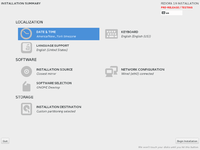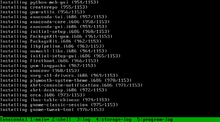Anaconda (installer)
Anaconda is a free and open-source system installer for Linux distributions.
 Anaconda's installation screen for Fedora 19 | |
| Developer(s) | Anaconda Team |
|---|---|
| Initial release | 1999 |
| Repository | |
| Written in | Python and C |
| Operating system | Linux |
| Available in | Multilingual |
| Type | System installer |
| License | GNU GPL (Free software) |
| Website | fedoraproject |
Anaconda is used by Red Hat Enterprise Linux, Oracle Linux, Scientific Linux, CentOS, Qubes OS, Fedora, Sabayon Linux and BLAG Linux and GNU, also in some less known and discontinued distros like Progeny Componentized Linux (based on Debian, founded by Ian Murdock), Asianux, Foresight Linux, Rpath Linux and VidaLinux (based on Gentoo Linux).[1]
Functionality

Anaconda offers a text-mode and GUI mode, so users can install on a wide range of systems. It is designed to be easily portable and supports a wide range of hardware platforms (IA-32, Itanium, DEC Alpha, IBM ESA/390, PowerPC, ARMv8). It supports installing from local storage devices like CD-ROM drives and harddisks as well as from network resources via FTP, HTTP, or NFS. Installations can be automated with the use of a kickstart file, that automatically configures the installation, allowing users to run it with minimal supervision. Before starting the OS installation process, the installer checks the system hardware and resource requirements. Only if the requirements are satisfied does it start the installation process.
Technology
It is mainly written in Python with some modules written in C. It has a graphical frontend that is based on GTK+ 3/PyGObject and designed with the Glade Interface Designer. Anaconda also has a custom text frontend with support for computers with line printer like terminals, such as the IBM ESA/390 mainframes.
See also
![]()
References
- "Anaconda/Distros - Fedora Project Wiki". fedoraproject.org. Retrieved 2020-05-02.